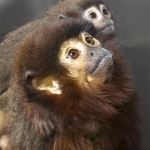The CNPRC scientists and staff’s daily activities support the responsibility that comes with the privilege of working with animals. They provide a humane environment for the animals in their care, and minimize the number of animals used according to IACUC approved protocols, and are dedicated to ensuring involvement in research is as comfortable as possible and seek alternatives to use whenever possible.
The CNPRC mission ensures the highest quality of animal care and well-being, and demonstrates leadership in the field of nonhuman primate care, enrichment and social housing. The state-of-the-art research and scientific findings at the Center contribute to the understanding and treatment of human and animal disease, but also increases knowledge of nonhuman primate behavior, nutrition, reproduction, development, health, and social networks, leading to further advancements in the level of care provided.
 The CNPRC houses approximately 4,000 monkeys for research. The majority are rhesus monkeys (Macaca mulatta), with a small population of South American titi monkeys (Callicebus cupreus).
The CNPRC houses approximately 4,000 monkeys for research. The majority are rhesus monkeys (Macaca mulatta), with a small population of South American titi monkeys (Callicebus cupreus).
Approximately 600 infants are born outdoors each year, primarily in the spring. The Center also houses an aged colony, ranging in age up to 38 years, and partially supported by the National Institute on Aging. The CNPRC is focused on expanding its colony of “specific pathogen free” or SPF monkeys to improve the health of the monkeys and safety of the personnel. SPF monkeys are bred to be free of several endogenous viruses that, while harmless to monkeys, can have severe and sometimes fatal consequences if contracted by humans.
Primate Services
Caring for Our Animals
A large staff of veterinarians, veterinary residents and animal health technicians care for the Center’s monkeys as well as provide research support. The animal care staff – about 100 individuals – feeds the animals, keeps their housing areas clean, monitors them daily, and works to promote the well-being of the animals in their care.
Physical, Social and Behavioral Enrichment
The CNPRC has a model environmental enrichment program for the benefit of all animals, indoors and outdoors. The goal is to provide daily enrichment and to facilitate psychological well-being through provision of multiple forms of environmental enrichment.
Behavioral Health Services
Proposals for research studies involving monkeys must be reviewed and approved by the UC Davis Institutional Animal Care and Use Committee (IACUC), which ensures that the project meets all federal laws governing animal care and use. Projects are also reviewed internally by the CNPRC Research Advisory Committee.
The CNPRC is a part of the UC Davis Animal Care Program which is accredited by the Association for Assessment and Accreditation of Laboratory Animal Care International (AAALAC), a private, nonprofit group that promotes the humane treatment of animals in science through voluntary accreditation. UC Davis is one of more than 770 research institutions and other organizations that have earned AAALAC accreditation, demonstrating its commitment to responsible animal care and use.
In addition, the CNPRC has regular, unannounced inspections by the U.S. Department of Agriculture, as required by the Animal Welfare Act passed by Congress in 1966.
Please see Oversight and Regulations for more information.














